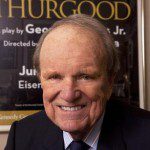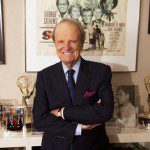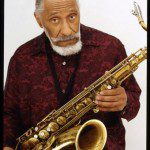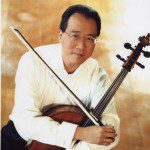George Stevens Jr.: the Man behind the Kennedy Center Honors
By • May 3, 2012 0 3854
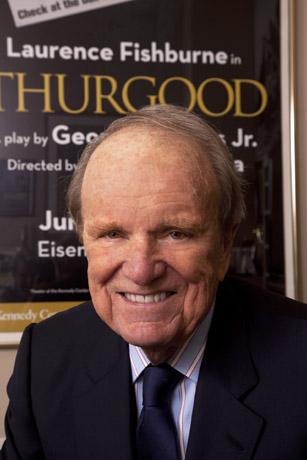
Talking with George Stevens, Jr. in his wonderland office at the Kennedy Center for the Performing Arts on a mid-November afternoon, you’d hardly know it was only two weeks until the annual national cultural fete and red-carpet extravaganza that is called the 34th Annual Kennedy Center Honors.
It was quiet at the Center, sun drenching the Hall of Nations foyer and Stevens ushering me in to his office, a remarkable place full of old movie posters, lots of Emmys and other awards, volumes of scripts and scrapbooks. Casually dressed in a blue sweater and slacks, he immediately takes you on a quick little tour of the walls and turns you into a gawker as you stare at a poster for “Shane,” a drawing of his father, the Oscar-winning film director George Stevens in a poker game with his friends, a poster for “The More the Merrier,” a 1940s more-or-less screwball comedy featuring Jean Arthur and Joel McCrea, a future star of gritty cowboy movies.
The office is best described as a vibrant display of the professional lives of Stevens Senior and Stevens Junior, which, taken together, are examples of lives lived that purposefully made a difference.
And we haven’t even talked about the Kennedy Center Honors, which this year, with all the usual glitz, glitter and presidential presence, will be bestowed upon Actress Meryl Streep, the phenomenal cellist Yo-Yo Ma, legendary Broadway chanteuse Barbara Cook, jazz original Sonny Rollins and singer Neil Diamond on Dec. 4 at the Opera House.
It all began in 1978 with honors to Marian Anderson, Fred Astaire, George Balanchine, Richard Rodgers and Arthur Rubinstein, and Stevens tells you a story about the audience jumping to its feet after seeing 1939 footage of Anderson singing at the Lincoln Memorial, having been denied use of Constitution Hall by the Daughters of the American Revolution.
It isn’t just that Stevens is and has been the producer of the Honors, both the live event at the Opera House and the CBS television show that is derived from it (to be aired Dec. 27 at 9 p.m.) It’s that basically, the Honors were his idea, inspired very much by the words of President John F. Kennedy, which can be found carved on the wall of the center.
“Well, it came out of a conversation with Roger Stevens [founding chairman of the Kennedy Center; no relation] back in 1974, and I suggested that the center really needed its own event,” Stevens said. “Roger asked if I had any ideas. And I did. I said that the center should have an event that honored the great figures in the performing arts. A lot had to be done, but that was the basic idea.”
It was more than that of course; it was about the very idea of the Kennedy Center itself and its basic tenets as expressed by Kennedy himself in a 1963 speech at Amherst. “That statement where he said ‘I look forward to an America that is not afraid of grace and beauty . . . I look forward to an America that will reward achievement in the arts as we reward achievement in business and statecraft.’”
Stevens allows that he has some influences on the choice—made by the Kennedy Center’s board of trustees but also national cultural figures, previous winners and others. The proceedings are, of course, secret, but Stevens adds, “I like to think I have considerable input.”
Also secret are the surprises that come with the night’s entertainment and special guests, like the outburst of talent that included Oprah Winfrey and Beyoncé honoring Tina Turner in 2006, or Jessica Simpson leading a star-studded array of female country superstars honoring Dolly Parton in 2008.
So is Margaret Thatcher coming for the Meryl Streep honors? “I don’t know about that,” Stevens said. “But there will be surprises.”
It’s fair to say that Stevens is a historically serious man. Being the founder of the Kennedy Center Honors is no small thing, but it’s not the only thing. There’s a note of serendipity that runs through his life and career, a kind of story with a theme about the value of culture as a way of moving hearts and minds. The Honors—an occasion for pomp and circumstances and rolling of red carpets—are nevertheless a celebration of the lifetime achievements and careers of legendary, giant-sized figures.
He has always said that the Honors are really two shows—the one that is staged in front of a stellar audience of 2,000 or so at the Opera House and the one that’s created to become a television show for the whole world.
“It’s quiet today,” he said. “But the week of the Honors—when the performers and the honorees fly in, the week of the dinners, the rehearsals, the logistics, and all the people you have to deal with, that’s still pretty intense, for me, and everyone else. It’s always thrilling; it’s always exciting, an honor and really hard work.”
For the past several years, Stevens, has worked with his son Michael as co-producer, on the Honors show and the “Christmas in Washington” yearly production. “Michael brings his own perspectives to this, his tastes, his knowledge, what he knows about music and the whole world of arts, the people he knows.
“And yes, it is very, very gratifying to work with Michael, for me, as a producer, in terms of the history of this enterprise, but also the family history. It means a lot to me as a father, and I have to tell you how important his contribution is to accomplishing what we do.”
Stevens has become with the years a kind of cultural icon in this city. He, his wife Elizabeth and his family have been Georgetown residents for decades on Avon Place. In interviews, in a recent roundtable talk on “Creativity in America” at the Aspen Institute, and in person Stevens always comes across as a serious man, without getting within a continent’s distance of becoming pompous or overbearing. He is one of the most accessible of public figures, one of the least “me-me” men you’ll encounter.
He’s led a big life in the big, wide world — son of legendary Hollywood director George Stevens, working on major movie sets, a JFK “New Frontiersman” working to produce documentaries for Edward R. Murrow when he headed the U.S. Information Agency, founder of the American Film Institute, leading film conservation and preservation, founder and co-producer of the Kennedy Center Honors, film director and producer (“A Filmmaker’s Journey,” “The Murder of Mary Phagan”) playwright (“Thurgood”) and author of “Conversations with the Great Moviemakers of Hollywood’s Golden Age at the American Film Institute”). In October, President Barack Obama named Stevens co-chairman of the President’s Committee on the Arts and Humanities.
That’s by way of roll-the-credits bona fides. In some circles, he’s even been described as “Hollywood royalty.”
“What do I think of that?” he says. “I think it’s mostly B-S.”
The truth of the matter is that he came to do what he’s done honestly: lots of hard work, the obvious ability to lead and a passionate, creative urge to be an advocate for culture, not only for its own sake but also for social change and justice.
“We didn’t have anything like the Kennedy Center Honors, and so we have celebrated all sorts of performance excellence,” he said. “And it changed with time, sure. More and more, we all realized the importance of popular culture, and it became a part of the mix: I think Bob Dylan was the first figure of that sort to become an honoree, but not the last.”
Stevens admits working on the Honors enriched him. “I’m a film guy,” he said, “that’s my experience, my comfort zone. So, being around these huge, legendary figures in dance, opera, music, that was an enormously rewarding experience for me.”
That seriousness of purpose, that liberality of spirit and focus, comes in part from his father. Making the documentary “A Film Directors Journey” set Stevens on his own creative path, much like his father’s two-year experience of World War II turned him into a man with a mission that resulted in the great American trilogy, “Shane,” “A Place in the Sun” and “Giant.” With Stevens Jr., the documentary on his father was followed by films about “The Murder of Mary Phagan,” “Separate but Equal” and the play “Thurgood” among other projects.
There are rows of scripts for each Kennedy Center Honors in his office, and each five-minute plus film about each honoree, not to mention scrapbooks and photographs for the AFI Lifetime Achievement Awards, which he has also produced. It’s dangerous being in that office; you get lost in it, so many scenes from movies start running through your head, so many stories.
You can imagine the Stevens spending hours here without ever being alone.
“It’s been 34 years since then,” he said. “I feel more creative, fuller of ideas than ever.” Proof: he’s about to finish a documentary about the Washington Post editorial cartoonist Herb Block, and a second set of “Conversations with Great American Directors” are coming out.
Of necessity, life and death and all that make for omissions on the Honors list. One obvious one is, of course, George Stevens, Sr., who died in 1975. You don’t ask, but chances are he would have been a cinch.
Speaking in public like the recent Aspen Institute or in interviews, Stevens often tells the story about being with his father after he had won the Oscar for Best Director for “A Place in the Sun.”
“He said to me ‘We’ll know how good it really is 20 or 30 years from now.’”
Stevens thinks it holds up, 50 plus years later. It’s an American classic. But Stevens’ life, adding up the accomplishments and their meaning, also hold up with time. The son, in this case, also rises to the occasion.
Kennedy Center Honorees
It’s star power week in Washington. This is the week of the 34th Annual Kennedy Center Honors, which means that among us will be five of the nation’s finest, most enduring and sparkling legends and stars of the performing arts.
Meryl Streep, touted as the most awarded and award-nominated actress ever, will be honored again this year. Her record: 45 film roles, 16 Oscar nominations and two wins, 25 Golden Globes and so on.
Yo-Yo Ma’s selection casts him in the shadows of the major classical music performers who formed a large number of the honorees in the early years of the Kennedy Center Honors. But to say he is a classical musician is to miss the pioneer, the genre-bender and the passionate cellist which he truly is. He has recorded 75 Sony Albums and has collaborated with the likes of Paquito Rivera, Renee Fleming, Dave Brubeck, Bobby McFerrin and James Taylor.
Sonny Rollins, the oldest among the honorees at 81, is one of the last of the old giants of bee-bop and improvisatory jazz on the saxophone, or anything else, as well as being a gifted composer. As he put it when he received the National Medal of Arts in March of this year, “I accept on behalf of the gods of our music.”
Barbara Cook may be, as Alistair Macaulay of the Financial Times says, “The greatest singer in the world,” but she’s actually a little more than that. She cut her singing teeth in the 1950s on national tours of “Oklahoma,” and “Carousel” and hit all the notes in the Leonard Bernstein’s “Candide.” Her career almost six decades: it’s so rich that it seems too short.
Neil Diamond has been around a long time too, and sometimes we forget that. Sixty-types remember all the big hits, forgetting that he also wrote the score to “Jonathan Livingstone Seagull,” wrote “You Don’t Bring Me Flowers” for Barbra Streisand and starred in a version of “The Jazz Singer.” He’s in the Rock and Roll Hall of Fame and the Songwriters Hall of Fame, and, according to Paul Simon, was once known as the Jewish Elvis Presley. Go figure.
The Gala Kennedy Center Honors performance will take place Dec. 4, co-produced by George Stevens Jr. and Michael Stevens, at the Opera House where the honorees will be saluted by performers, their peers, the powerful and the president. The Honors Gala will be broadcast on CBS Dec. 27 at 9 p.m.
- George Stevens Jr. | Photo by Philip Bermingham


